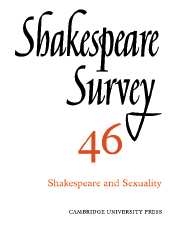Book contents
- Frontmatter
- Shakespeare and Sexuality
- As Who Liked It?
- Malvolio and the Eunuchs: Texts and Revels in Twelfth Night
- The Scandal of Shakespeare’s Sonnets
- Weaving and Writing in Othello
- ‘That’s She that was Myself’: Not-so-Famous Last Words and Some Ends of Othello
- ‘The Catastrophe is a Nuptial’: The Space of Masculine Desire in Othello, Cymbeline, and The Winter’s Tale
- Reconstructing The Winter’s Tale
- Late Shakespeare: Style and the Sexes
- The Virgin Not: Language and Sexuality in Shakespeare
- Fleshing his Will in the Spoil of her Honour: Desire, Misogyny, and the Perils of Chivalry
- Bowdler and Britannia: Shakespeare and the National Libido
- Shakespeare and the Ten Modes of Scepticism
- Shakespeare Performances in England, 1992
- Professional Shakespeare Productions in the British Isles, January-December 1991
- 1 Critical Studies
- 2 Shakespeare’s Life, Times, and Stage
- 3 Editions and Textual Studies
- Books Received
- Index
‘The Catastrophe is a Nuptial’: The Space of Masculine Desire in Othello, Cymbeline, and The Winter’s Tale
Published online by Cambridge University Press: 28 March 2007
- Frontmatter
- Shakespeare and Sexuality
- As Who Liked It?
- Malvolio and the Eunuchs: Texts and Revels in Twelfth Night
- The Scandal of Shakespeare’s Sonnets
- Weaving and Writing in Othello
- ‘That’s She that was Myself’: Not-so-Famous Last Words and Some Ends of Othello
- ‘The Catastrophe is a Nuptial’: The Space of Masculine Desire in Othello, Cymbeline, and The Winter’s Tale
- Reconstructing The Winter’s Tale
- Late Shakespeare: Style and the Sexes
- The Virgin Not: Language and Sexuality in Shakespeare
- Fleshing his Will in the Spoil of her Honour: Desire, Misogyny, and the Perils of Chivalry
- Bowdler and Britannia: Shakespeare and the National Libido
- Shakespeare and the Ten Modes of Scepticism
- Shakespeare Performances in England, 1992
- Professional Shakespeare Productions in the British Isles, January-December 1991
- 1 Critical Studies
- 2 Shakespeare’s Life, Times, and Stage
- 3 Editions and Textual Studies
- Books Received
- Index
Summary
I want in this essay to listen to some of Shakespeare’s jealous husbands as they discover the pathos and panic of male sexuality within a marital economy of masculine possessiveness. Since my attention to the suffering of men may seem perverse, let me begin by acknowledging the infinitely greater impositions of that economy on women. Petruccio’s boast – “I will be master of what is mine own. / She is my goods, my chattels. She is my house, / My household-stuff, my field, my barn, / My horse, my ox, my ass, my anything” (3.3.101–4) – may conceal or reveal whatever lovable little ironies it wants, but still it registers the plain facts of the Elizabethan laws of coverture. Modern historians who disagree on other matters agree on this: thus Lawrence Stone writes that ‘By marriage, the husband and wife became one person in law – and that person was the husband. He acquired absolute control of all his wife’s personal property, which he could sell at will’; and Martin Ingram, who thinks that Stone exaggerates the iron claim of patriarchy and underestimates the role of affection in Elizabethan marriage, writes that ‘married women had no property rights independent of their husbands; while the law prescribed that “the husband hath . . . power and dominion over his wife, and may keep her by force within the bonds of duty, and may beat her” (albeit not in “a violent and cruel manner”). Ann Jennalie Cook quotes a 1632 treatise called The Lawes Resolutions of Womens Rights: '“That which the Husband hath is his owne”, while “That which the Wife hath is the Husbands”': 'At the end of the wedding day', Cook writes, 'the woman yielded up her body, her name, and her worldly goods.'
- Type
- Chapter
- Information
- Shakespeare Survey , pp. 69 - 80Publisher: Cambridge University PressPrint publication year: 1993
- 1
- Cited by



